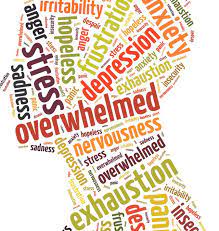Do you want to stop ruminating OCD in which you feel like you can’t stop thinking about something? It is a common condition in people with OCD. In this blog post, we will discuss rumination OCD and how to overcome it. We will also provide a guide to overcoming OCD. If you are struggling with OCD, please don’t hesitate to seek help! There is no need to suffer in silence.
Contents
What Is Rumination OCD?

Rumination OCD is a type of Obsessive-Compulsive Disorder (OCD) in which someone feels like they can’t stop thinking about something. It can be anything from worrying about the future to obsessing over past events or mistakes. People with rumination OCD may become preoccupied with the idea that something bad could happen if they don’t think about something in a certain way.
Common Symptoms Of Rumination OCD?
These are some of the signs and symptoms of rumination OCD:
- Excessive worry and anxiety.
- Difficulty in Concentrating.
- Obsessively thinking about a particular event or situation.
- Always seeking reassurance and fear of making mistakes.
- Avoiding conversations, activities, and people due to fear of making mistakes.
- Intrusive violent thoughts of harming oneself or others.
- Constantly doing a checklist in order to feel secure.
- Irrational thoughts about the future or past events.
- Obsessive questions over the meaning of life or existentialism.
- Feeling overwhelmed by small tasks or decisions.
What Causes Rumination OCD?
There are vast possibilities of what can cause rumination OCD. It includes traumatic life events, genetics, and psychological issues. It is important to note that no single factor causes rumination OCD. However, it is believed that underlying anxiety or depression may play a role in its development. Schizophrenia is a specific condition that can increase the risk of rumination OCD. Any kind of phobia is also a likely contributor to rumination OCD.
The Link Between Rumination And OCD

Rumination is a common symptom of OCD. People with OCD tend to have intrusive thoughts and worries that they can’t stop thinking about. This leads to rumination, which is when someone fixates on their negative thoughts or fears for an extended period of time. This can lead to further anxiety and distress, as well as attempts to cope with rumination through compulsions.
Rumination is not a form of OCD, but just a part of it. It is characterized by an individual’s inability to stop thinking about something, and this tends to cause excessive worry and anxiety.
Diagnosis Of Rumination OCD
Rumination OCD is diagnosed based on an individual’s symptoms, thoughts, and behaviors. It is important to note that rumination OCD is not a stand-alone condition, but part of Obsessive-Compulsive Disorder (OCD). Therefore, it should be diagnosed by a mental health professional who specializes in the diagnosis and treatment of OCD. It is possible through a variety of tests and assessment tools to get a diagnosis.
How To Stop Ruminating OCD?

Here are some ways how to stop ruminating OCD:
Look For Distraction
Find an activity that can distract you from your worries. This could be anything from reading a book, going for a walk, doing yoga, or listening to music. These activities can help break the cycle of rumination and allow you to focus on something else.
Exercise And Change Your Routine
Exercise can be an effective way to combat rumination. It releases endorphins and helps reduce stress, which can help relieve some of the anxiety associated with OCD. Additionally, changing up your routine can help break the cycle of rumination, as it forces you to think differently.
Meditation
Meditation is a powerful tool to help people manage their rumination OCD. It involves focusing on the present moment and allowing thoughts to come and go without judgment. This helps individuals become aware of their thoughts and feelings, which can help them better manage their anxiety and rumination.
Mindfulness Activity
Mindfulness activities can be a great way to practice managing rumination. This involves focusing on the present moment and your own thoughts, feelings, and sensations without judgment or attachment. You can write a journal and listen to music.
Talk To Someone
Talking to someone can be a great way to work through intrusive thoughts. It is important to find someone who you trust, such as a therapist or other healthcare professional. Talking with them can help you get to the root of your rumination OCD and provide strategies for managing it more effectively.
Question Intrusive Thoughts
When faced with an intrusive thought, try to take a step back and question it. Ask yourself: “Is this thought rational?” or “Am I just worrying about something that isn’t likely to happen?” This can help you realize that the thought may not be as serious as it seems and provide some relief from rumination.
Get Professional Help
If your rumination OCD is severe or getting in the way of living a normal life, it may be time to seek professional help. A mental health specialist can provide you with personalized strategies and treatment options that are best suited for your condition.
- CBT: Cognitive Behavioral Therapy is the most effective form of treatment for rumination OCD. It helps you identify your negative thought patterns and replace them with more positive ones. It is helpful for you to gain control over your thoughts and behaviors, reducing the intensity and frequency of rumination episodes.
- ERP: Exposure And Response Prevention is another form of therapy that helps individuals with OCD. It involves exposing you to triggers or situations and then helping you manage your reactions and responses without resorting to compulsions.
- MBBT: Mindfulness-Based Behavioral Therapy is a form of therapy that focuses on becoming aware of your thoughts and feelings in the present moment. This helps you to focus on the task at hand and be more resilient to intrusive thoughts.
Medication
Your doctor may prescribe medication such as selective serotonin reuptake inhibitors (SSRIs) to treat rumination OCD. SSRIs work by blocking the reabsorption of serotonin, a neurotransmitter in the brain that helps regulate mood and behavior. This can help reduce your rumination OCD symptoms.
Conclusion
Rumination OCD is a challenging condition to live with, but it can be managed with the right strategies and treatments. To stop ruminating OCD, try activities like exercise, meditation, mindfulness, talking to someone, or questioning intrusive thoughts to help manage your rumination OCD. Additionally, you may want to consider seeking professional help such as CBT, ERP, or MBBT. Lastly, in some cases, your doctor may prescribe medication to help you manage rumination OCD symptoms.
Take care, and don’t forget that you are not alone! OCD is a mental health disorder characterized by obsessions and compulsions. If you have any queries regarding OCD treatment, ERP therapy experienced therapists at OCDMantra can help: Book a trial OCD therapy session


